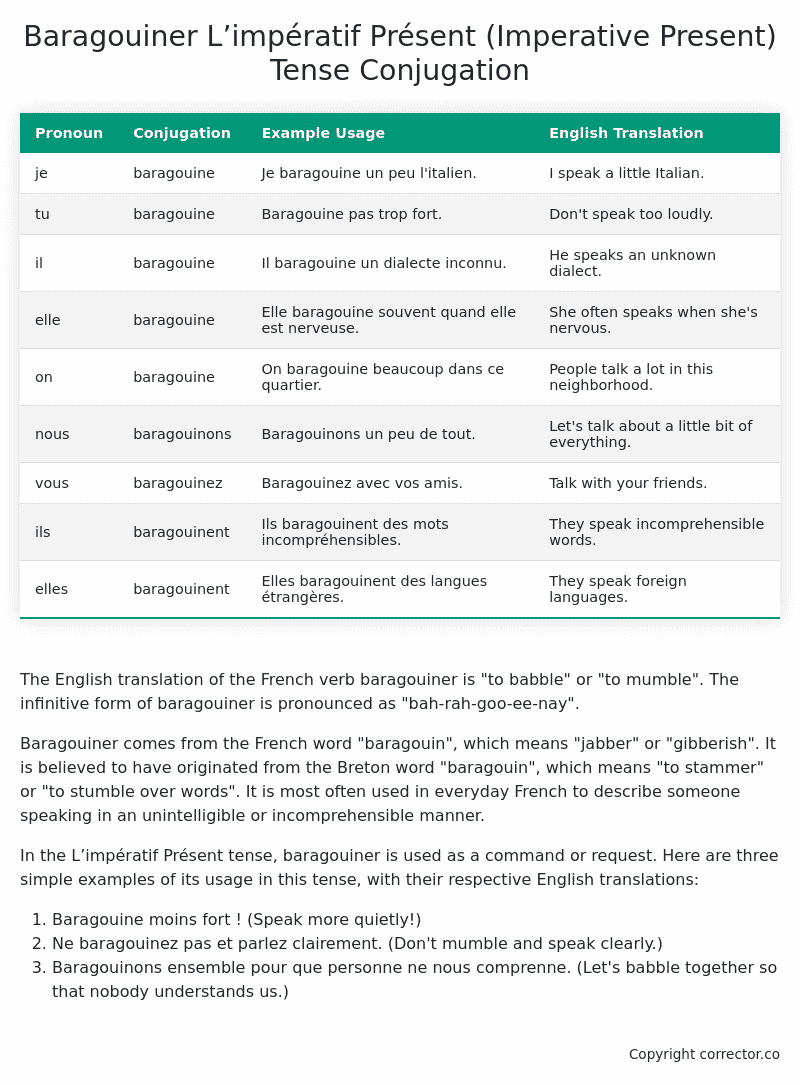L’impératif Présent (Imperative Present) Tense Conjugation of the French Verb baragouiner
Introduction to the verb baragouiner
The English translation of the French verb baragouiner is “to babble” or “to mumble”. The infinitive form of baragouiner is pronounced as “bah-rah-goo-ee-nay”.
Baragouiner comes from the French word “baragouin”, which means “jabber” or “gibberish”. It is believed to have originated from the Breton word “baragouin”, which means “to stammer” or “to stumble over words”. It is most often used in everyday French to describe someone speaking in an unintelligible or incomprehensible manner.
In the L’impératif Présent tense, baragouiner is used as a command or request. Here are three simple examples of its usage in this tense, with their respective English translations:
- Baragouine moins fort ! (Speak more quietly!)
- Ne baragouinez pas et parlez clairement. (Don’t mumble and speak clearly.)
- Baragouinons ensemble pour que personne ne nous comprenne. (Let’s babble together so that nobody understands us.)
Table of the L’impératif Présent (Imperative Present) Tense Conjugation of baragouiner
| Pronoun | Conjugation | Example Usage | English Translation |
|---|---|---|---|
| je | baragouine | Je baragouine un peu l’italien. | I speak a little Italian. |
| tu | baragouine | Baragouine pas trop fort. | Don’t speak too loudly. |
| il | baragouine | Il baragouine un dialecte inconnu. | He speaks an unknown dialect. |
| elle | baragouine | Elle baragouine souvent quand elle est nerveuse. | She often speaks when she’s nervous. |
| on | baragouine | On baragouine beaucoup dans ce quartier. | People talk a lot in this neighborhood. |
| nous | baragouinons | Baragouinons un peu de tout. | Let’s talk about a little bit of everything. |
| vous | baragouinez | Baragouinez avec vos amis. | Talk with your friends. |
| ils | baragouinent | Ils baragouinent des mots incompréhensibles. | They speak incomprehensible words. |
| elles | baragouinent | Elles baragouinent des langues étrangères. | They speak foreign languages. |
Other Conjugations for Baragouiner.
Le Present (Present Tense) Conjugation of the French Verb baragouiner
Imparfait (Imperfect) Tense Conjugation of the French Verb baragouiner
Passé Simple (Simple Past) Tense Conjugation of the French Verb baragouiner
Passé Composé (Present Perfect) Tense Conjugation of the French Verb baragouiner
Futur Simple (Simple Future) Tense Conjugation of the French Verb baragouiner
Futur Proche (Near Future) Tense Conjugation of the French Verb baragouiner
Plus-que-parfait (Pluperfect) Tense Conjugation of the French Verb baragouiner
Passé Antérieur (Past Anterior) Tense Conjugation of the French Verb baragouiner
Futur Antérieur (Future Anterior) Tense Conjugation of the French Verb baragouiner
Subjonctif Présent (Subjunctive Present) Tense Conjugation of the French Verb baragouiner
Subjonctif Passé (Subjunctive Past) Tense Conjugation of the French Verb baragouiner
Subjonctif Imparfait (Subjunctive Imperfect) Tense Conjugation of the French Verb baragouiner
Conditionnel Présent (Conditional Present) Tense Conjugation of the French Verb baragouiner
Conditionnel Passé (Conditional Past) Tense Conjugation of the French Verb baragouiner
L’impératif Présent (Imperative Present) Tense Conjugation of the French Verb baragouiner (this article)
L’infinitif Présent (Infinitive Present) Tense Conjugation of the French Verb baragouiner
Struggling with French verbs or the language in general? Why not use our free French Grammar Checker – no registration required!
Get a FREE Download Study Sheet of this Conjugation 🔥
Simply right click the image below, click “save image” and get your free reference for the baragouiner L’impératif Présent tense conjugation!

Baragouiner – About the French L’impératif Présent (Imperative Present) Tense
Usage
Giving commands
Making requests
Offering advice
Expressing desires
Conjugation Formation
Interactions with other tenses
Want More?
I hope you enjoyed this article on the verb baragouiner. Still in a learning mood? Check out another TOTALLY random French verb conjugation!


